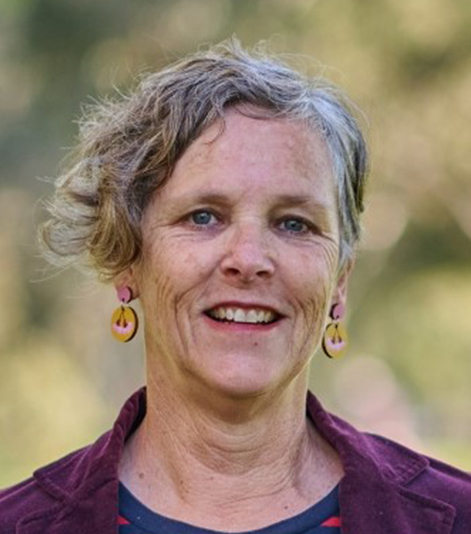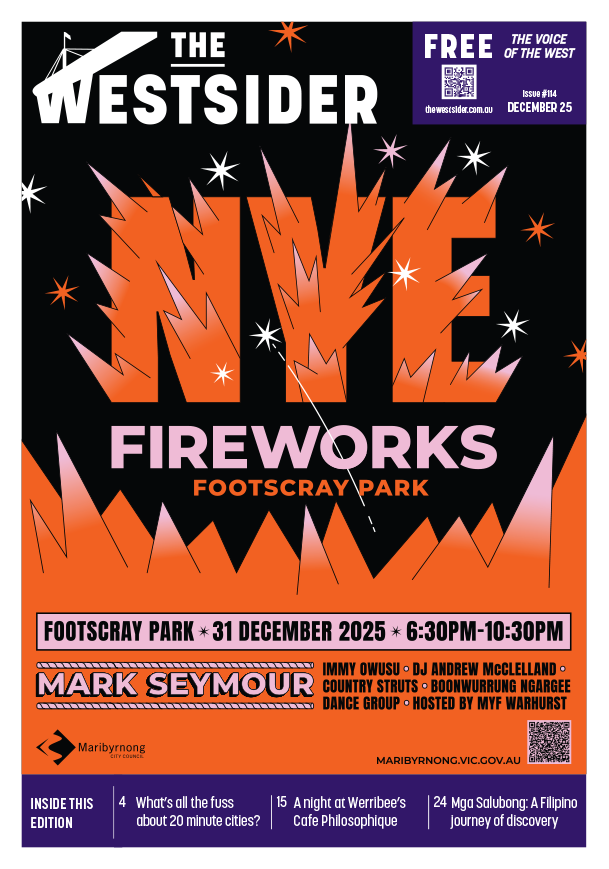Are you a member of a political party, political group, or community advocacy group? (eg; Labor, Liberal, Greens, Socialist, My Place, Angry Victorians, Better West, environment groups, etc)
Yes. I’ve been a member of the Australian Greens Victoria for 16 years. I’m also a member of the Friends of Stony Creek, MTAG, Justice Action Maribyrnong, and BikeWest. In 2020 I was a member of Council’s Climate Emergency Community Advisory Group. In 2018 when the Tottenham/West Footscray fire occurred, I was part of an advocacy group asking for adequate resources from the state government for clean up and rehabilitation of the creek, and a member of the Stony Creek recovery group.
What is the most important issue facing your electorate?
Population growth is perhaps the most important issue facing Maribyrnong. The impacts of the state government’s latest announcement that the Maribyrnong population will increase by 114% by 2050 will put additional pressure on open space, community services, childcare availability, transport, housing affordability and availability, libraries, aquatic and sports facilities. We need the state government and developers to properly fund community infrastructure and green and open space, at the same time population growth occurs.
Should/how can Council support local businesses?
Work in partnership with local traders’ associations, especially those that take a creative approach to bringing people from outside Maribyrnong to our commercial areas, and ensure locals know where to shop and play locally. Taking an integrated approach, involving artists, creatives, foodies, storytellers, historians, and technology means that we’ll be exploring ideas together. Council should take a stronger advocacy stance with the state government about absentee and landbanking landlords that impact on the vibrancy of our shopping areas.
Should/how can Council support local creatives and industries?
Continued and increased investment in our creative community via grants, professional development, purpose-built facilities, and advocacy to the state government to invest in the ‘creative hub precinct’ of Footscray. Joining other major Maribyrnong institutions, like Footscray Community Arts, Victoria University, the Western Bulldogs, Footscray Hospital, and others to create a supportive working environment for creatives and artists and continue the creative culture that has been built in Maribyrnong over many decades. Investigating creative ways to enable creatives to continue to ‘call Maribyrnong home’ in the context of the housing crisis is imperative if Maribyrnong is to remain a creative City.
Should/how can Council help alleviate the impact of climate extremes on local communities and ecosystems?
Maribyrnong’s location means that the urban heat island effect is a continuing threat for our residents. Greening our streets and neighbourhoods with street tree planting and enabling residents to make their nature strips greener, saving large old trees through planning instruments, and finding space for more green and open spaces will assist with this.
When heatwaves inevitably return, Council’s heatwave plan should be broad enough to respond quickly, opening up community centres, libraries, aquatic centres, and sports pavilions etc. for those in our community who are vulnerable to the effects of heatwaves, allowing them some respite from the heat.
Parts of our community are vulnerable to flooding from the Maribyrnong River. Climate disasters are with us to stay. Council should work with state government agencies like Melbourne Water, to support the community through planning processes, providing flood information and mapping, and improving emergency responses.
Should/how can Council help alleviate cost of living and homelessness?
Council can help by creating a robust housing strategy that reflects community priorities, population increases, state government housing policies, and plans for the delivery of community infrastructure; that recognises the importance of affordable housing and establishes affordable housing targets that can be applied to development. Increasing developer contributions to provide much needed open space and community infrastructure is key to alleviating the cost to the community.
Council can push the state government to develop a realistic definition of affordable housing, one that reflects the current housing crisis and costs. It can continue to work with other councils to ensure high building standards that minimise costs, promote sustainable living, and make it easier for homeowners to make improvements – such as no/removal of gas connections; EV charging for cars, bikes, and scooters in new developments and in the community; solar PV and community solar projects; and better manage on-street parking to reflect community value and use.
Maribyrnong can commit to eliminating houselessness in Maribyrnong and pursuing ‘Maribyrnong Zero’ as part of the Melbourne Zero model working towards zero houselessness across the City.
Broadening council’s community sustainability engagement program to consider bulk buys for solar panels, electric bikes and vehicles, and to focus on helping renters and other vulnerable households reduce their greenhouse emissions will assist with cost of living.
What should Council stop spending money on?
It’s important for any organisation to consistently review spending to make sure that there is transparency in decisions being made about where rates revenue and grant funding is being spent, and how fees and charges are applied. Residents should feel confident that these decisions are being made in the best interests of the community.
Reducing spending requires decisions about cutting or changing services for the community. Investigating collective purchasing, tenders, and contracts with other local government areas is a good place to start to enable economies of scale via spending on goods and services. Council should also look to those services which the state government has shifted (known as cost shifting) to local government without adequate or any additional resourcing.
Should the public be allowed to ask live, unscripted questions of councillors during council meetings?
Council’s governance rules only allow residents to address Council during City Development Delegated Committee (town planning) meetings if they have previously submitted an objection or support for a planning matter. This should be extended to Council meetings, so that residents can speak in favour of or against a Council report. During this term of Council, I was instrumental in extending the timeline for submitting public questions to both the Council and City Development Delegated Committee meetings to 6pm (just before the start of the meetings).
I support allowing residents to speak at Council meetings, and to ask their own questions at public question time.
Can you please provide a short personal statement detailing what your priorities are if elected, and what your vision for your electorate looks like.
If re-elected, I want to continue my work to improve the way Council engages with residents, bringing a community development approach to decision making, and exploring creative ways of engaging and involving the community.



